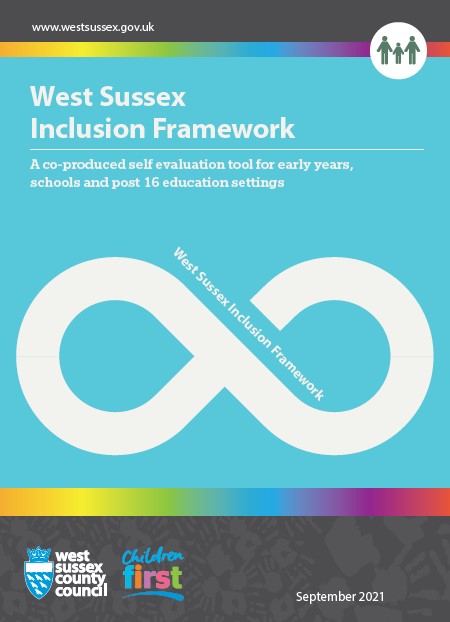
West Sussex Inclusion Framework September 2021 doc
Is there evidence that…
- The school has a system in place to ensure that there is joint planning and provision for those who manage pastoral / inclusion / behaviour and Special Educational Need and/ or Disability (SEND) provision.
- There is a clear provision map which identifies children and young people (CYP) with additional needs along with the provision that has been put into place, the cost of the provision and how the support is monitored and reviewed for impact.
- There is effective use of resources and key staff to ensure early identification of needs and that appropriate support is put in place for individual CYP.
Discussion prompts / evidence of impact
- The special educational needs co-ordinator (SENCO) is a member of the school’s senior leadership team (SLT). The SLT ‘champions’ inclusion within the school and ensures there is a system in place for whole school provision planning to meet the CYP’s pastoral, social and emotional needs that impact on learning, well-being and behaviour.
- Leaders, at all levels, champion inclusion.
- There is transparency of funding in schools and staff understand how the funding is used.
- The SENCO is aware of the notional budget and can evidence how they manage resources and the impact of SEND expenditure. There are designated leads who are aware of and have responsibility for the SEN budget, and for making sure it improves outcomes for CYP. Governors oversee the expenditure and hold school leaders to account for the impact of this.
- The school can demonstrate how delegated SEND funding is improving outcomes for CYP with SEND since joining the school and how pupil premium funding is improving outcomes for these CYP. This includes service families, Children Looked After, adopted children and previously looked after CYP.
- The designated leader with responsibility for Pupil Premium plans appropriately for the spending of the funding and regularly evaluates the impact of these strategies. Governors are aware of and hold school leaders to account for the impact of the spend. Funding is used to address identified barriers.
- School leaders including governors can explain the rationale for the allocation of resources – this includes professional development and resources used to support CYP and staff’s emotional well-being and mental health.
- All teachers are inclusive teachers; the role of the SENCO is focused on the leadership of inclusive practice and SEND across the school and has the remit and capacity within the school to affect change as needed.
- The curriculum is effectively planned and adapted to meet the needs of all CYP and is therefore contextualised for their school community.
- The school intervention map provides an overview of interventions, personalised provision and associated costings term by term. It shows that resources are used flexibly and are constantly under review based on impact.
- The school reviews the impact of its provision maps, for example by proactively seeking and acting on the views of CYP, reviewing the curriculum, conducting learning walks, scrutinising CYP work, reviewing progress data, talking to disadvantaged groups and parents of identified CYP and / or following CYP through a school day, in order to evaluate the effectiveness of provision and to identify further areas for improvement.
- The school has an identified member/s of staff for different groups. They are clear about their role, e.g. Looked After or Pupil Premium CYP, transition, pastoral and well-being leads. The identified member of staff receives regular training and attends relevant network meetings to ensure they keep up to date with national and local initiatives. For example, SENCO forums, ELSA Networks, Locality Groups, DSL networks.
- Staff working with CYP with complex / high level of needs receive regular supervision to provide opportunity for reflection and problem solving and to make best use of staff expertise and experience.
- The SLT consistently evaluates the progress of individuals to actively address specific needs (academic/social etc.) and there is evidence of targeting resources to support the CYP, e.g. Pupil Premium.
Last updated 16 August 2021
 Tools for Schools
Tools for Schools